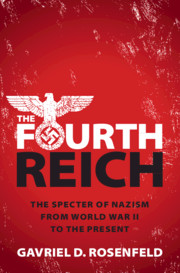The Fourth Reich by Gavriel D. Rosenfeld
/The Fourth Reich: The Specter of Nazism from World War II to the Present
By Gavriel D. Rosenfeld
Cambridge University Press, 2019
Even while the rubble of Berlin was still smoldering in 1945, lurid reports were already circulating that all of that bitter fighting had ultimately been for nothing: high-ranking Nazis, including Hitler himself, had successfully fled the ruins of the Third Reich and reached Argentina in submarines loaded with looted gold, there to establish what journalist Gerrard Williams has called “a Fourth Reich in the sun.”
As Gavriel Rosenfeld, professor of history at Fairfield University, elaborates at in his riveting new book, the idea of a Fourth Reich was ready to hand. The Fourth Reich: The Specter of Nazism from World War II to the Present chronicles in unprecedented depth the long and torturous provenance of a bad dream, from its origins while the Third Reich was still alive and paying its bills right down to the present day: to the intense humiliation of every American, a book about the specter of potential fascist revival will inevitably have many mentions of Donald Trump, who has pined for North Korean style autocratic control, speculated on not relinquishing power, and established concentration camps on American soil.
The idea of a Fourth Reich, the looming threat and promise of it, runs through Rosenfeld’s engagingly-written book like a leitmotif from some grotesque and never-ending Wagner symphony. The dream of a new Reich animated former Nazi officials like Werner Naumann, one of the architects of the Gauleiter plot of 1952 that sought to topple the Adenauer government. Naumann, former state secretary in the Reich Ministry of Propaganda, was, as Rosenfeld writes, a “true believer” in the Nazi dream. “One cannot simply abandon an ideal that one has believed in so long, as I have,” Naumann wrote in 1950. “Perhaps more values remain [buried] in the ruins of the Reich Chancellery than hasty critics believe.”
The Gauleiter plot was crushed, and all other attempts at creating a Fourth Reich have likewise been thwarted. But as Rosenfeld insightfully points out, tangible implementation has little effect on myths, except maybe to encourage them:
For the most part, scholars have dismissed the idea of the Fourth Reich as a sensationalistic myth. But this is true only in the strictest sense of the term. The Fourth Reich is undeniably mythic insofar as it has never come into existence. But that very fact ironically proves its value. The Fourth Reich’s existence in the realm of the possible has prevented it from entering the realm of the real. If it is a myth, it has been a necessary one.
The Fourth Reich is the carefully-documented anatomy of a standing threat, one that has moved like deadly quicksilver from the back rooms of Stasi meeting halls in East Germany to the unlit corners of 8chan and the Dark Web. That threat is always watching, and it has a common vocabulary. Gavriel Rosenfeld has written its history and, in chilling detail. given some shape to its ideological playbook.
--Steve Donoghue is a founding editor of Open Letters Monthly. His book criticism has appeared in The Boston Globe, The Wall Street Journal, The Historical Novel Society, and The American Conservative. He writes regularly for The National, The Washington Post, The Vineyard Gazette, and The Christian Science Monitor. His website is http://www.stevedonoghue.com.
